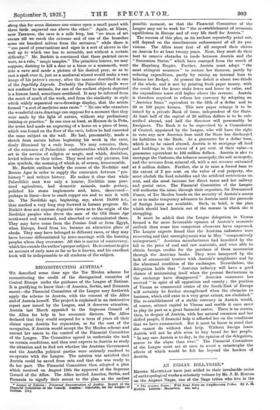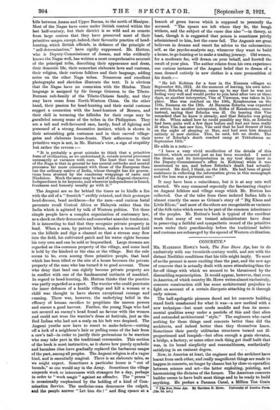AN INDIAN HILL-TRIBE.* Mossits. Maceurzan have just added to their
invaluable series of anthropological works a scholarly volume by Mr. J. H. Hutton on the Angami Nagas, one of the Naga tribes who live in the
• The Angami Napes : With Some Nola on Neighbouring Tribes. By 4. Hutton. London : Macmillan. 40e. net.]
hills between Assam and Upper Burma, to the north of Manipur. Most of the Nagas have come under British control within the last half-century, but their district is so wild and so remote
from large centres that they have preserved most of their primitive usages, except, indeed, their favourite practice of head- hunting, which British officials, in defiance of the principle of " self-determination," have rigidly suppressed. Mr. Hutton, who is Deputy-Commissioner of Assam, and who evidently knows the Nagas well, has written a most comprehensive account of the principal tribe, describing their appearance and dress, their domestic life, their somewhat elaborate laws and customs, their religion, their curious folklore and their language, adding notes on the other Naga tribes. Numerous and excellent photographs and sketches illustrate the text. It is obvious that the Nagas have no connexion with the Hindus. Their language is assigned by Sir George Grierson to the Tibeto- Burman sub-family of the Tibeto-Chinese family, and they may have come from North-Western China. On the other hand, their passion for head-hunting and their social customs suggest a connexion with the head-hunters of Borneo, and their skill in terracing the hillsides for their crops may be
.paralleled among some of the tribes in the Philippines. They are a tall and well-favoured race, hardy, fond of fighting and possessed of a strong decorative instinct, which is shown in their astonishing gala costumes and in their carved village- gates and elaborate house-fronts. Their adherence to their primitive ways is not, in Mr. Hutton's view, a sign of stupidity but rather the reverse :—
" It is probably a great mistake to think that a primitive form of civilization, as wo understand it, entails mental processes necessarily at variance with ours. The least that can be said of the Naga is that in general he has mental outlooks and mental processes far more consonant with those of the European than has the ordinary native of India, whose thought has for genera. tions been stunted by the cumbrous wrappings of caste and Hinduism. Much the same may be said of the Angami character. Independence is its keynote, and wherever independence is found, frankness and honesty usually go with it."
The Angami are so far behind the times as to kindle a fire with the aid of a " firestick " swiftly rotated, and their grotesque head-dresses, bead necklaces—for the men—and curious festal garments recall Central Africa or Malaysia rather than the India which is agitated by talk of Western politics. Yet these simple people have a complex organization of customary law, as a check on their democratic and somewhat anarchic tendencies. It is interesting to find that they recognize private property in land. When a man, by patient labour, makes a terraced field on the hillside and digs a channel so that a stream may flow into the field, his cultivated patch and his water rights become his very own and can be sold or bequeathed. Large streams are regarded as the. common property of the village, and some land is held by the kindred or the clan or the village. But the rule seems to be, even among these primitive people, that land which has been tilled or the site of a house becomes the private property of the man who has turned it to good account. Those who deny that land can rightly become private property are in conflict with one of the fundamental instincts of mankind. In regard to head-hunting, Mr. Hutton thinks that the practice was partly regarded as a sport. The warrior who could penetrate the inner defences of a hostile village and kill a woman or a child was thought to have shown exceptional courage and cunning. There was, however, the underlying belief in the efficacy of human sacrifice to propitiate the unseen powers and ensure a good harvest. Further, the young Naga who had not secured an enemy's head found no favour with the women and could not wear the warrior's dress at festivals, just as the Red Indian who had not a scalp on his belt was despised. The Angami youths now have to resort to make-believe—cutting off a look of a neighbour's hair or pulling some of the hair from a cow's tail—in order to justify their pretensions to be warriors who may take part in the traditional ceremonies. This section of the book is most instructive, as it shows how purely symbolic and harmless rites have gradually replaced the barbarous usages of the past, among all peoples. The Angami religion is of a vague kind, and is essentially magical. There is an elaborate tabu, as we might expect. Sometimes a particular house is " out of bounds," as one would say in the Army. Sometimes the village suspends work or intercourse with strangers for a day, perhaps in order to " work magic " against an offender. The " penna " is occasionally emphasized by the holding of a kind of Corn- urination Service. The medicine-man denounces the culprit, and the people answer " Let him die ! " and fling spears at a
branch of green leaves which is supposed to personify the accused. "The spears are left where they lie, the bough
withers, and the subject of the curse dies also "—in theory, at least, though it is suggested that poison is sometimes privily administered to him, lest the curse fail. The" Angamis are great believers in dreams and resort for advice to the subconscious self, as the psycho-analysts say, whenever they want to build a house, to go hunting or to make a trading journey. Old women, for a moderate fee, will dream on your behalf, and foretell the result of your plan. The author relates from his own experience one curious instance of the Angami belief that to dream of a man dressed entirely in new clothes is a sure premonition of his death :—
" He left Kohima for a tour in the Kezama villages on September 8th, 1913. At the moment of leaving, his own inter- preter, Zelucha of Jotaoma, came up to say that he was not feeling very well and would prefer to join later after two or three days, so another interpreter, Vise of Viswema, was taken in his place. Mao was reached on the 10th, Kezakenoma on the 11th, Razama on the 13th. At Razama Zelucha was expected to arrive, but another interpreter, Solhu of Kezakenoma, came instead, saying that Zeluche, was ill. On hearing this Vise remarked that he knew it already, and that Zelucha was going to die. When asked how he could possibly say this, as Zelucha had been quite well a few days before and had not been really ill when Vise last saw him, Vise said that he had dreamt of him on the night of sleeping at Mao, and had seen him dressed entirely in new clothes. This, he said, left no doubt. The news of Zelueha's death reached camp at Tekhubama on September 16th."
He adds in a note:— "I have a very vivid recollection of the details of this incident, which occurred just as has been recorded. I noted the dream and its interpretation in my tour diary (now in the Deputy-Commissioner's office in Kohima) when it was mentioned to me, and before Zelueha's death had actually occurred. He died, I think,- on the 14th. He had been of great assistance in collecting the information given in this monograph and the loss was a personal one."
It may have been a coincidence, but it is at any rate well attested. We may commend especially the fascinating chapter on Angami folklore and village songs which Mr. Hutton has
collected. One of the tales from these isolated Indian hills is almost exactly the same as Grimm's story of " Big Klaus and Little Klaus," and most of the others are recognizable as variants of the folk-tales which seem to be part of the common inheritance of the peoples. Mr. Hutton's book is typical of the excellent work that many of our trained administrators have done in preserving a faithful and sympathetic record of the primitive races under their guardianship before the traditional habits and customs are submerged by the spread of Western civilization.



































 Previous page
Previous page